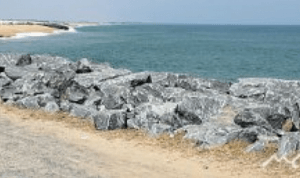Three institutions to support ocean economies in Africa
 Three international institutions have announced an African Package for climate-resilient ocean economies at the ongoing COP22 in Marrakech.
Three international institutions have announced an African Package for climate-resilient ocean economies at the ongoing COP22 in Marrakech.
They are the Food and Agriculture Organisation (FAO), World Bank and African Development Bank.
The package, which is in the form of technical and financial assistance, is to mobilise $500-900 million and implement programmes linked to climate change adaptation and mitigation over the period of 2017-2020.
The initiative is to support ocean economies in Africa and build greater resilience of coastal areas to climate change based on the countries’ specific priorities and objectives.
This was made known at a special Oceans Action Event which brought together high-level participants from around the world to advance oceans and climate change issues and to pledge concrete actions in support of the objectives of Sustainable Development Goal 14, which is to conserve and use the oceans, seas and marine resources sustainably.
According to Maria Helena Semedo, the FAO Deputy Director-General for Natural Resources; “African coastal communities are some of the most affected by climate change”.
She said the FAO was fully engaged and ready to be at the heart of those significant developments to work alongside countries and communities to reduce their vulnerabilities, build their resilience, and maximise opportunities emerging from climate change.
Laura Tuck, the World Bank Group Vice President for Sustainable Development, said the World Bank was pleased to be a part of the international mobilisation of financing in response to the Mauritius Communiqué.
The package presented could make a significant contribution to meeting the adaptation needs of African countries as they developed their ocean economies.
Dr Biliana Cicin-Sain of the Global Ocean Forum, said: “The Global Strategic Action Initiative on Oceans and Climate, which involves parties, IGOs, NGOs, academic institutions, private sector groups, and local authorities from all world regions, will implement actions identified in the roadmap to safeguard the health of the oceans and the wellbeing of coastal and island populations”. Morocco announced its Blue Belt Initiative aimed at building the resilience of coastal communities and promoting sustainable fisheries and aquaculture in keeping with SDG14 expectations.
Focus areas will include integrated coastal monitoring systems, sustainable fisheries and aquaculture throughout the entire value chain.
Solutions for adaptation and contributions to curbing greenhouse gas are proposed as part of a priority roadmap for implementation.
The initiative is supported by an investment plan and capacity building program of 60 million US dollars over the period of 2017-2020, building on the Blue Growth Initiative launched at COP 21 in Paris.
COP22 Ocean Action partners have released a Strategic Action Roadmap on Oceans and Climate: 2016 to 2021, which provides a vision for action regarding oceans and climate in the next five years.
This addresses six ocean and climate issue areas: the central role of oceans in regulating climate, mitigation, adaptation, displacement, financing, and capacity development.
Source: GNA
